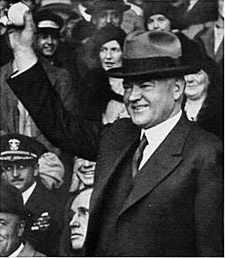

|
Reflections on Black History ______ Part 64 |
Herbert Hoover and black Republicans
by Thomas C. Fleming, Dec 9, 1998 1932 was one of the real low years of the Great Depression. Millions of people left their homes when their plant closed down, and farmers who were unable to sell their produce sought jobs in other industries. Hundreds of thousands of job-seekers came to California, and both local and state government discovered that they were unable to cope with what was a national problem. The homeless did not flock to the inner areas of the cities, as they do now. But their presence was just as vivid -- hundreds living in shacks built of cardboard and wood on the outskirts of the cities. 1932 was the year the bonus marchers came to Washington. The government had promised a bonus of $500 to all veterans of World War I, but it was not supposed to be paid until 1945. When the Depression came, the men wanted the bonus right away, because they needed anything they could get. So a call went out, and they descended on Washington in jalopies, on freight trains -- any way they could get there. I knew some black guys in California who went back there because of the bonus.
President Herbert Hoover at baseball game, circa 1930. The Army used tear gas on them, and even put a couple of tanks out there, as a means of intimidation. A lot of the marchers were badly beaten. They finally dispersed and went home. I was outraged; I didn't see the necessity to treat them in this manner. In the election of 1928, I voted for Norman Thomas, the socialist candidate. I didn't care for Herbert Hoover at all, because he was an exceedingly conservative Republican. His principal platform was to make the Republican Party a lily-white party. A lot of blacks understood that he wanted to uphold all Jim crow practices. That's how he got white support in the South. Because before that, everybody in the South voted Democratic, except blacks, who didn't vote at all. There were some black Republican leaders in the South who could go downtown and fix a traffic ticket or make a gambling raid. They didn't have any real influence, but it was better than what the Democrats did for blacks. Up until the 1932 election that elevated a Democrat, Franklin D. Roosevelt, to the presidency, black voters largely avoided the Democratic Party. Many Democratic members of both the House and Senate were racial segregationists. Some, like Theodore Bilbo, who served in the House and then the Senate for his native Mississippi, never made any statement without revealing their extremist racial views. Bilbo, it was said, campaigned on a one-line sentence, "I'm against niggers," at which the rabble would shout and applaud. Blacks outside of Mississippi called him "the man." Then there was Tom Heflin, a senator from Alabama who was given the name of "Tom-Tom" by his adoring constituents, because he was a loudmouth who repeated himself like he was banging a drum. Both of these sterling examples of Southern politicians were residents of rural areas. Farmers who scratched out a miserable existence felt they were better than blacks, and any real or fancied crime that blacks might commit could lead to the hapless suspect facing a lynch mob. Most times the sheriff and his staff took part themselves. In Chicago, blacks had more observable political muscle than anywhere else in the nation. Oscar dePriest was elected to Congress in 1928, representing the South Side of Chicago. He was the first black elected to Congress in the 20th century, and the first from any Northern state. During Reconstruction, a number of former slaves were elected from several states because they were Republicans, and had the protection of the Union Army, which assured blacks the right to vote. Those heady days ended when the last of the federal troops were withdrawn from the South in 1877. Oscar DePriest served three terms. He was defeated in 1934 by Arthur Mitchell, a black man who was a Democrat. Blacks did not come into the Democratic Party until Roosevelt's New Deal began in 1933, and even then it was very slow. The Democratic Party in the South was organized like a private club that banned all but whites. Any black who had the temerity to challenge the system might end up being jailed, or in some extreme cases, pay with his life. The New Deal changed a lot of things for black Americans -- not as much as many of us hoped, but blacks realized that Roosevelt offered more than the Republicans did. When Roosevelt supported the suffrage of all Americans, although his support was very modest, whites began their desertion of the party.
Copyright © 1998 by Thomas Fleming. Email. At 90, Fleming continues to write each week for the Sun-Reporter, San Francisco's African American weekly, which he co-founded in 1944. Black Life in the Sacramento Valley 1850-1934, a 100-page book co-authored with Michele Shover, is available for $7. A 48-page book of his stories and photos from 1907-19 is available for $3, and a 90-minute cassette tape of his recollections of black life in Florida, Harlem and Chico from 1912-1926 is available for $5. All prices include postage. Send mailing address or call 415-771-6279.
Fleming Biography More Fleming articles Back to Front Page |